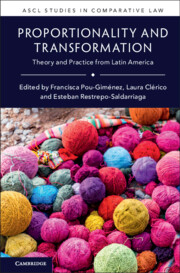Book contents
- Proportionality and Transformation
- Ascl Studies in Comparative Law
- Proportionality and Transformation
- Copyright page
- Contents
- Editors
- Contributors
- Acknowledgments
- Introduction
- Part I Proportionality and Processes of Constitutionalization
- Part II Proportionality in Social Rights and Equality-Based Adjudication
- Part III Proportionality, between Transformation and the Status Quo
- 10 Between Exception and Transition
- 11 Proportionality and State Ius Puniendi
- 12 Distributional Analysis as an Alternative to Proportionality Analysis in Judicial Decision-Making
- 13 Proportionality, Social Justice and Democracy
- 14 Unilateralism, Dialogue and False Necessity
- Epilogue
- Index
10 - Between Exception and Transition
Proportionality and Necessity in the Colombian Quest for Peace
from Part III - Proportionality, between Transformation and the Status Quo
Published online by Cambridge University Press: 27 October 2022
- Proportionality and Transformation
- Ascl Studies in Comparative Law
- Proportionality and Transformation
- Copyright page
- Contents
- Editors
- Contributors
- Acknowledgments
- Introduction
- Part I Proportionality and Processes of Constitutionalization
- Part II Proportionality in Social Rights and Equality-Based Adjudication
- Part III Proportionality, between Transformation and the Status Quo
- 10 Between Exception and Transition
- 11 Proportionality and State Ius Puniendi
- 12 Distributional Analysis as an Alternative to Proportionality Analysis in Judicial Decision-Making
- 13 Proportionality, Social Justice and Democracy
- 14 Unilateralism, Dialogue and False Necessity
- Epilogue
- Index
Summary
Proportionality purports to contrast means with ends to decide whether a specific rule breaches the Constitution. The chapter starts by analyzing discussion of the 2016 agreements between the Colombian government and the FARC guerrilla in the Colombian Constitutional Court, whose justices split over the standard of review to be used to decide the scope of the special legislative powers conferred to the president to implement the Peace Agreement. Part of the Court believed that those special presidential powers were to be scrutinized under stringent standards similar to those applied in judicial review of emergency powers. Others pointed out, by contrast, that those powers were to be deployed not in an emergency setting, but in a transitional one where more lenient standards of review apply. The chapter suggests that this debate between exception and transition illuminates the analysis of how judicial discourses build relations between means – legislative and executive norms – and goals – attaining peace – adding dimensions to the proportionality/necessity framework as a field where judges deploy their powers to exert political control over other public branches. While the Court framed the debate around the concept of “necessity,” Colombian constitutional discussions suggest that necessity and proportionality could even be interchangeable concepts.
Keywords
- Type
- Chapter
- Information
- Proportionality and TransformationTheory and Practice from Latin America, pp. 223 - 242Publisher: Cambridge University PressPrint publication year: 2022

